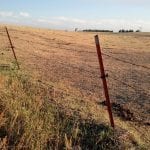BIRD CITY, KS – The 2023 Tri-State Cow Calf Symposium will be Friday, January 27th in Bird City, Kansas. This event is produced by K-State Research and Extension, Nebraska Extension, and Colorado State University Extension and rotates between the three states. The symposium will focus on adapting in times of uncertainty and more specifically consider the strains that drought has put on producers in the tri-state area. Continue reading “2023 Tri-State Cow Calf Symposium Planned for Jan. 27th”





